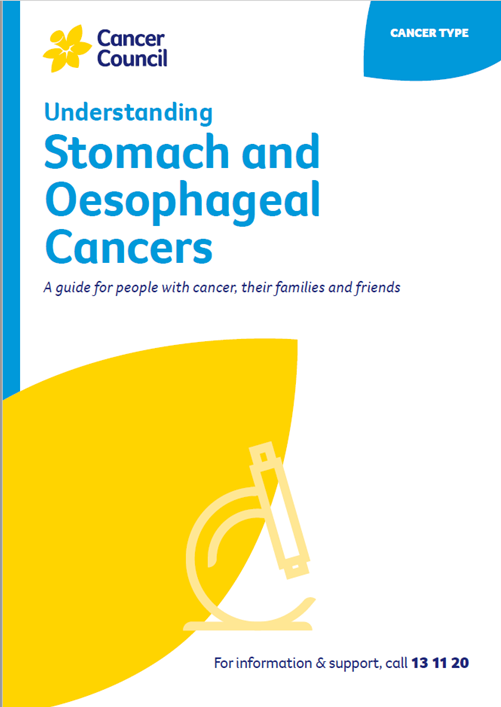- Home
- Stomach cancer
- Treatment
Stomach cancer treatment
Your health care team will recommend treatment based on where the cancer is in the stomach, and whether it has spread (the stage). Treatment will also depend on your age, medical history, nutritional needs and general health.
Surgery is often part of the treatment for stomach cancer that has not spread. If the cancer has spread, treatment may also include chemotherapy, targeted therapy, immunotherapy or radiation therapy.
Learn more about:
- Making treatment decisions
- What to do before treatment starts
- Endoscopic resection for stomach cancer
- Surgery
- Chemotherapy
- Targeted therapy
- Radiation therapy
- Palliative treatment
What to do before treatment starts
Taking steps to improve your general health before treatment can help to ensure the best outcomes (called prehabilitation). You may also have some tests to check your general health, including blood tests and heart checks.
Improve diet and nutritionPeople with stomach cancer often lose a lot of weight and can become malnourished. Your doctor will usually refer you to a dietitian for advice on how to slow down the weight loss. | |
Stop smokingIf you smoke or vape, aim to quit before starting treatment. People who keep smoking may not respond as well to treatment. See your doctor or call the Quitline on 13 7848 for advice and support. | |
Begin or continue an exercise programExercise can help build your strength for recovery. Talk to your doctor, exercise physiologist or physiotherapist about an exercise plan. For more on this, call 13 11 20 or see Exercise and cancer. | |
Avoid alcoholTalk to your doctor about your alcohol use. Alcohol can affect how the body works and increase the risk of complications after surgery (including bleeding and infections), and of the cancer returning. | |
Talk to someoneYou may find it useful to talk to a counsellor or psychologist about how you are feeling. This can help you deal with any anxiety about diagnosis and treatment. Or call 13 11 20 to find out about Cancer Council’s support services. |
Endoscopic resection for stomach cancer
Very early-stage tumours in the inner layers of the stomach (mucosa) may be removed with an endoscope through endoscopic resection. For some people, this may be the only treatment they need. You usually stay in hospital overnight for endoscopic resection. Preparation and recovery are similar to an endoscopy, but there is a slightly higher risk of bleeding or a small tear in the stomach (perforation).
→ READ MORE: Making treatment decisions
Podcast: Making Treatment Decisions
Listen to more episodes from our podcast for people affected by cancer
More resources
Prof David I Watson, Matthew Flinders Distinguished Professor of Surgery, Flinders University, and Senior Consultant Surgeon, Oesophago-Gastric Surgery Unit, Flinders Medical Centre, SA; Prof Bryan Burmeister, Senior Radiation Oncologist, GenesisCare Fraser Coast and Hervey Bay Hospital, QLD; Kieran Cahill, Consumer; Jessica Jong, Clinical Dietitian, Upper GI and Hepatobiliary Services, Peter MacCallum Cancer Centre, VIC; John Leung, Consumer; Prof Rajvinder Singh, Professor of Medicine, University of Adelaide, and Director, Gastroenterology Department and Head of Endoscopy, Lyell McEwin Hospital, SA; Dr Sarah Sutherland, Medical Oncologist, Chris O’Brien Lifehouse, NSW; Paula Swannock, Upper GI Cancer Nurse Consultant, St Vincent’s Hospital Melbourne, VIC; Rebecca Yeoh, 13 11 20 Consultant, Cancer Council Queensland.
View the Cancer Council NSW editorial policy.
View all publications or call 13 11 20 for free printed copies.

